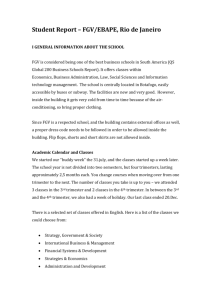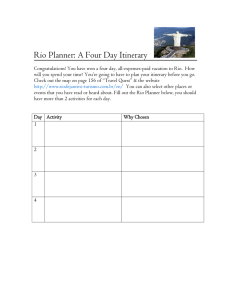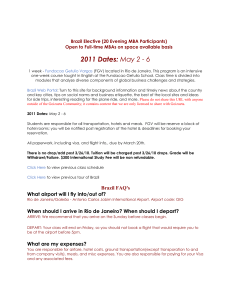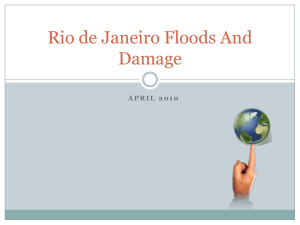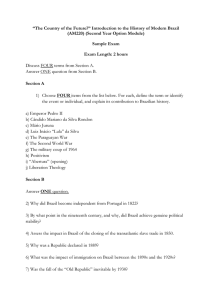Student Report Exchange semester: Fall, 2013
advertisement
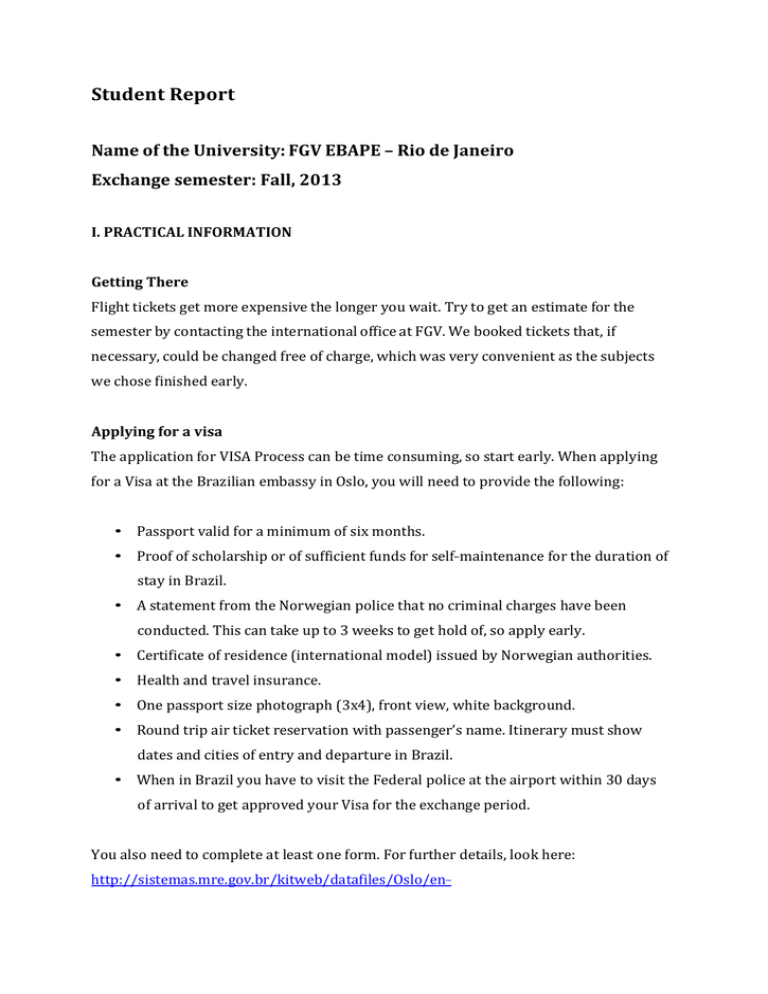
Student Report Name of the University: FGV EBAPE – Rio de Janeiro Exchange semester: Fall, 2013 I. PRACTICAL INFORMATION Getting There Flight tickets get more expensive the longer you wait. Try to get an estimate for the semester by contacting the international office at FGV. We booked tickets that, if necessary, could be changed free of charge, which was very convenient as the subjects we chose finished early. Applying for a visa The application for VISA Process can be time consuming, so start early. When applying for a Visa at the Brazilian embassy in Oslo, you will need to provide the following: • Passport valid for a minimum of six months. • Proof of scholarship or of sufficient funds for self--‐maintenance for the duration of stay in Brazil. • A statement from the Norwegian police that no criminal charges have been conducted. This can take up to 3 weeks to get hold of, so apply early. • Certificate of residence (international model) issued by Norwegian authorities. • Health and travel insurance. • One passport size photograph (3x4), front view, white background. • Round trip air ticket reservation with passenger’s name. Itinerary must show dates and cities of entry and departure in Brazil. • When in Brazil you have to visit the Federal police at the airport within 30 days of arrival to get approved your Visa for the exchange period. You also need to complete at least one form. For further details, look here: http://sistemas.mre.gov.br/kitweb/datafiles/Oslo/en--‐ us/file/Vitem%20IV%20undergraduate,%20master%20or%20doctorate%20student,% 20internship.pdf or contact the Brazilian embassy via mail at: consular@brasil.no. We highly recommend that you book an appointment with the federal police well in advance. They are busy and if you do not register within 30 days, you will end up paying a fine. Contact the international office and they will provide you with information on how to register and book an appointment. Travel From our apartment in Copacabana to FGV in Botafogo we took the Metro. One ticket is R$3,20, which is approximately 8 NOK. The taxis are quite cheap in Rio de Janeiro. When going out for dinner or going out after dark, we took a taxi. Housing EBAPE/FGV does not supply housing. International students need to seek private accommodation. The international office can provide assistance and counselling to students in this matter. Finding an apartment in Rio might be difficult. Before leaving, we did some research and ended up finding a Norwegian owned apartment (were we knew the owners) at Copacabana, which was available for us to rent. This was a big advantage, as we did not need to spend weeks searching for an apartment after arrival. The international office provides an information package where long list of different web pages similar to Finn.no are presented. However, finding an apartment before you go to Rio is not recommended due to potential fraud. The huge language barrier makes it difficult. We would recommend you to ask your buddy at the university for help. Costs Rio de Janeiro is an expensive city. Depending on the standard, housing expenses will amount to 3500--‐5000 NOK a month. Food is quite expensive, although, not compared to Norway. Meat, taxi, alcohol and mobile phone expenses are of the cheaper goods. We purchased pre--‐paid SIM card from TIM. In total, for 5 months, I think I ended up spending 300 NOK. The 3G service is not perfect, but it works. You can expect to spend 10.000 NOK per month on housing, food, transportation and fun. Culture and language Few Brazilians speak English. The wealthier families in Rio are well educated and speak English. As FGV is an expensive school, most students have no problem in communicating in English. You will get the chance to practice your Portuguese everywhere you go in Rio. Use Brazilian friends to learn the language. II. ABOUT THE SCHOOL FGV EBAPE is located in Botafogo, about 10 minutes drive from Copacabana/Ipanema. It is considered one of the best business schools in South America. FGV is a respected school and is located inside a building, which contains external offices as well. There is a strict building dress code needed to be followed in order to be allowed to enter the building. Flip flops, shorts, tank tops and short skirts are not allowed inside. Inside the building it gets very cold. The Brazilians love air--‐conditioning, so be prepared and bring proper clothing. The international office will find a buddy for you. It was inconvenient that we did not get the name of our buddy until after arrival. We were able to get in touch with them after one week at school. Course registration We needed to fill out an interest form for the first term and send it to the international office at FGV by the end of June. There are a selected number of classes offered in English. This is the list we could choose from: • 1st term – 5/8/13 until 10/10/13: o Brazilian Macroeconomics Scenario o Brazilian History and Culture o The Politics of Governance in Brazil o Brazilian Business Environment • 2nd term – 14/10/13 until 19/12/13: o Brazilian Financial Markets o Communications across Cultures o Brazilian Legislation o Innovation Management in Emerging Countries o International Business: An Emerging Market Perspective o Negotiation in a Global Context o Strategic Management o Entrepreneurship The add/drop period was two weeks after the first lecture had begun. We attended all four classes the first week and ended up dropping out of one class. This is a good time to attend all classes of interest and add or drop out according to the classes you find most interesting. You have the option to take classes in Portuguese if you are up to that. We were offered free Portuguese classes for the first term. The class is 1,5 hour, twice a week and finishes up with a final exam. The classes were very basic and we would recommend other schools if you really want to learn Portuguese. Academic calendar The orientation day took place on August 1st and the first day of lecture was August 5th. . The school year is not divided into two semesters, but four trimesters. The first term (3rd trimester) was from august 5th until October 10th, while second term (4th trimester) started the 14th of October and ended December 19th. You choose how many classes you will attend each term. We attended 3 classes in the first term and 2 classes in the second term. Our last class ended December 9th, which is unusual. The school year’s official end date was December 19th. The International Office The ladies at the international office are very helpful and easy to get in contact with. You can ask them for help with anything and they will provide a good answer. Social activities There are very little social activities organized by the school. With about 60 international students there will always be social activities to participate in. REI is an organisation for international students in Rio de Janeiro. They organize different activities like hiking, parties, and weekend trips (https://.facebook.com/REIRJ?fref=ts). They will introduce themselves at orientation day. III. ACADEMICS In the classroom The classes were small with 10--‐30 students. Each subject is 30 hours divided on 10 days. 75 % attendance is mandatory, which means you can only miss two out of 10 lectures in each subject. The lectures are characterized by high degree of oral activity and you will get credit for participation. The workload and level of difficulty were lower than at BI. As long as you do the required assignments, you will more than pass the subject. Course materials The lecturer provided all necessary course material. Exams The exam was based on the lectures. You will get a total grade from 1--‐10 in each subject, which will be based on, depending on the subject: • Participation • Group presentations and/or assignments • Final exam Description of courses List of courses we attended. 1st term: o Brazilian Macroeconomics Scenario: Participation One hour presentation Final Exam o Brazilian History and Culture Participation Assignment Presentation o Brazilian Business Environment Participation 3 presentations One final assignment 2nd term: o International Business: An Emerging Market Perspective Participation Presentation Individual case test o Strategic Management Participation Case presentation Group presentation and final paper based on presentation Multiple choice exam The academic level of the courses is not on the same level as subjects on the master programme at BI. IV. General Information Climate We expected Brazil to be hot and sunny almost every day. In reality, the temperature varies a lot from one day to another. The first day we arrived in July there were 27 degrees. The day after it was 13 degrees. Be prepared and bring different clothing. However, normal temperature was around 20--‐25 degrees until October and about 25--‐30 degrees from October until December. We experienced a lot of rain, which was unexpected. Nevertheless, we had many sunny days as well. Travelling We recommend you to travel and experience different parts of the country. Popular destinations close by are Ihla Grande, Buzios, Iguazu Falls, Sao Paulo, Buenos Aires and Florionapolis. Great hiking opportunities, as well as things to see surround Rio. We recommend: • Dois Irmaos • Pedro da Gavea (Highest top in Rio) • Pao de Acucar (Sugar Loaf) • Cristo Redentor • Escadaria Selaron (famous stairs in Lapa) • Santa Marta Favela Surfing is also a popular and easy accessible activity in Rio, and Barra da Tijuca (an hour south of Rio) proves as a great windsurfing spot. We had an amazing time in Rio de Janeiro. It was an adventure and experience for life getting to know a different culture, language and people. Please feel free to contact us through the international office at BI for any additional information or questions you might have.
